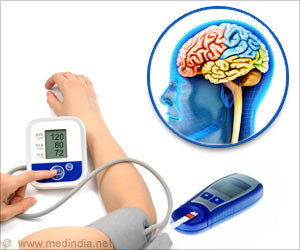Intensive lowering of blood pressure significantly improves mildly impaired cognitive function, i.e. thinking, memory and reasoning abilities but does not significantly reduce the risk of dementia, as per a recent study.
- Aggressive lowering of blood pressure significantly reduces the risk of mild cognitive impairment (MCI), which is a well-known risk factor and precursor of dementia
- Currently, 47 million people are diagnosed with dementia worldwide and figures are estimated to reach 75 million by 2030
- At present, there are no proven measures to lower or prevent dementia risk. However, intensive blood pressure control is safe for the brain and could be a potential measure to reduce the risk
Read More..
What is MCI?
Mild cognitive impairment (MCI) is when people have a slightly decreased ability to do activities such as thinking, reasoning, and remembering compared to what is normal for people of their age. Dementia refers to a much more severe loss in the ability to perform cognitive functions and affects activities of daily living and makes the patient dependent on others.Blood Pressure Control & Effect on MCI and Dementia
The SPRINT-MIND study, i.e. Systolic Blood Pressure Intervention Trial - Memory and Cognition in Decreased Hypertension, was an integral part and planned an extension of the initially designed SPRINT study.The initial SPRINT study was a large randomized trial which looked at the effects of intensive lowering of blood pressure on heart and kidney function. The SPRINT trial was halted in August 2015 after 3.3 years but the SPRINT MIND study to determine MCI and dementia risk proceeded as planned for the full five years
- The volunteers in SPRINT were adults 50 years and older at increased risk of heart disease
- Intensive blood pressure control was defined in the study as a systolic blood pressure target of less than 120 mmHg, versus a standard target of less than 140 mmHg
- From November 2010 to March 2013 over 9,300 participants were randomly assigned to one of the two blood pressure target groups with nearly 4,700 in each group
- The SPRINT MIND trial hoped to determine if intensive blood pressure control would also reduce the risk of developing dementia and cognitive impairment over the ensuing five years
- The SPRINT MIND participants were grouped into either one of three categories namely, no cognitive impairment, mild cognitive impairment (MCI), or probable dementia
- Cognitive tests were assigned to participants with the history of high blood pressure but no prior history of stroke or diabetes when the trial began and more than 91 percent had at least one follow up
- The primary results did not demonstrate a statistically significant difference between standard and intensive treatment of blood pressure in the proportion of participants who had dementia. However, the study had fewer cases of dementia than expected
- However, the secondary results demonstrated that the intensive blood pressure treatment lowered the risk of MCI as well as the combined risk of MCI and dementia
"The fact that there was still an MCI result when the study was cut short makes these results encouraging," explained Laurie Ryan, Ph.D., chief of the Dementias of Aging Branch in the NIA Division of Neuroscience.
Scope of Study
Currently, there are no other measures to reduce or prevent the risk of dementia and the results of the SPRINT MIND study suggest that intensive blood pressure control is safe for the brain and can potentially be a modifiable risk factor to reduce the risk of MCI (and future dementia). Persons should, therefore, consult their doctors and together decide the best way to reach their blood pressure goals through lifestyle modifications or medications."This is a landmark study in that it is the first trial of its size and scope to look at a modifiable risk factor for dementia and MCI," said Lenore J. Launer, Ph.D., a senior investigator in the NIA Laboratory of Epidemiology and Population Sciences and co-author of the paper. "The study had a carefully designed hypothesis, used approved appropriate tools to assess dementia and MCI, was blinded for diagnosis, and got a good sample of older people."
Reference:
- Effect of Intensive vs Standard Blood Pressure Control on Probable Dementia - (http://dx.doi.org/10.1001/jama.2018.21442)
Source-Medindia
















